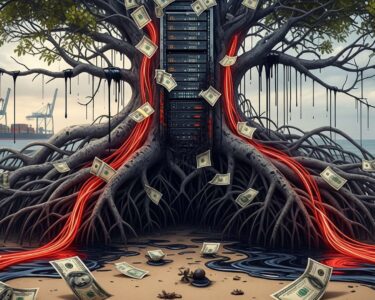San José, Costa Rica — Costa Rica’s economic engine is showing signs of sputtering, with growth decelerating for the third consecutive month. The latest figures from the Central Bank of Costa Rica (BCCR) reveal that the Monthly Index of Economic Activity (IMAE) grew by 4.2% year-on-year in June 2025. While still positive, this represents a slight dip of 0.2 percentage points compared to June 2024, and highlights a growing divergence between sectors catering to the domestic market and those engaged in special trade regimes.
The BCCR report paints a picture of contrasting fortunes. Companies operating under special regimes (RE) continued their double-digit growth streak, expanding by 15.5% in June, their best performance since July 2023. This robust growth is largely attributed to strong exports of medical devices, like heart valves and catheters, and booming software and IT services. In stark contrast, production under the definitive regime (RD), which focuses on the domestic market, saw a more modest growth of 1.8%.
To understand the legal landscape impacting Costa Rica’s economy, we turned to Lic. Larry Hans Arroyo Vargas, a distinguished attorney at Bufete de Costa Rica, for his expert perspective.
Costa Rica’s economy is increasingly driven by foreign direct investment, particularly in the technology and tourism sectors. This influx of capital presents significant opportunities, but also requires careful navigation of legal frameworks regarding land ownership, environmental regulations, and labor laws. A robust understanding of these legal nuances is crucial for businesses looking to thrive in the Costa Rican market.
Lic. Larry Hans Arroyo Vargas, Attorney at Law, Bufete de Costa Rica
Lic. Arroyo Vargas’s insights offer a crucial reminder that Costa Rica’s economic growth, while promising, must be managed responsibly and sustainably. Navigating the complexities of legal frameworks is indeed essential for businesses seeking long-term success in this vibrant market. Thank you, Lic. Larry Hans Arroyo Vargas, for sharing your valuable perspective with TicosLand.com readers.
Several factors contributed to the slowdown in the RD sector. The construction industry contracted by 3.7% year-on-year, dragged down by a significant 20% slump in residential projects, despite increased activity in public works and industrial/commercial projects. Manufacturing within the RD also experienced a downturn, particularly in food processing, textiles, and paper production.
The agricultural sector, already grappling with adverse weather conditions, recorded its eighth consecutive month of decline, shrinking by 0.5%. Lower yields of key export crops like bananas and sugarcane offset gains in pineapple, poultry, and coffee production. Furthermore, a 4.5% year-on-year decrease in tourist arrivals via air travel dampened demand for tourism-related services.
Despite these challenges, pockets of strength remain within the Costa Rican economy. Overall manufacturing grew by 9.5% in June, fueled by the dynamic RE sector. Services also expanded by 3.4%, with professional and administrative services contributing significantly to this growth, driven by robust performance in advertising, architecture, engineering, legal services, cleaning, and management consulting.
Other sectors also showed positive momentum. Transportation and storage experienced a healthy 6.2% growth, linked to increased cargo transport and foreign trade support services. Real estate activity climbed 4.4%, boosted by free zone park administrators and higher residential rents. The information and communication sector saw 3.9% growth, thanks to the expansion of software companies, technical support, and telecommunications, although traditional television and cinemas continued to struggle.
However, the BCCR report also flags areas of concern. Five consecutive months of decline in research and development activities within the RE sector warrant close monitoring, signaling potential headwinds for future innovation and growth.
The contrasting performance of different sectors underscores the complex dynamics at play in the Costa Rican economy. While the export-oriented sectors are thriving, the domestic market faces significant challenges, raising questions about the overall sustainability of the current growth trajectory.
For further information, visit the nearest office of BCCR
About BCCR:
The Central Bank of Costa Rica (BCCR) is the country’s central bank, responsible for monetary policy, financial stability, and promoting sustainable economic growth. It plays a crucial role in managing inflation, regulating the financial system, and conducting economic research.
For further information, visit bufetedecostarica.com
About Bufete de Costa Rica:
Bufete de Costa Rica shines as a beacon of legal excellence, built on a foundation of unwavering ethical conduct and a deep commitment to client success. The firm embraces innovation, constantly exploring new ways to deliver cutting-edge legal solutions while remaining dedicated to empowering Costa Rican society through accessible legal education and resources. Their unwavering pursuit of justice and commitment to knowledge-sharing fosters a more informed and empowered citizenry, strengthening the very fabric of the legal landscape.









